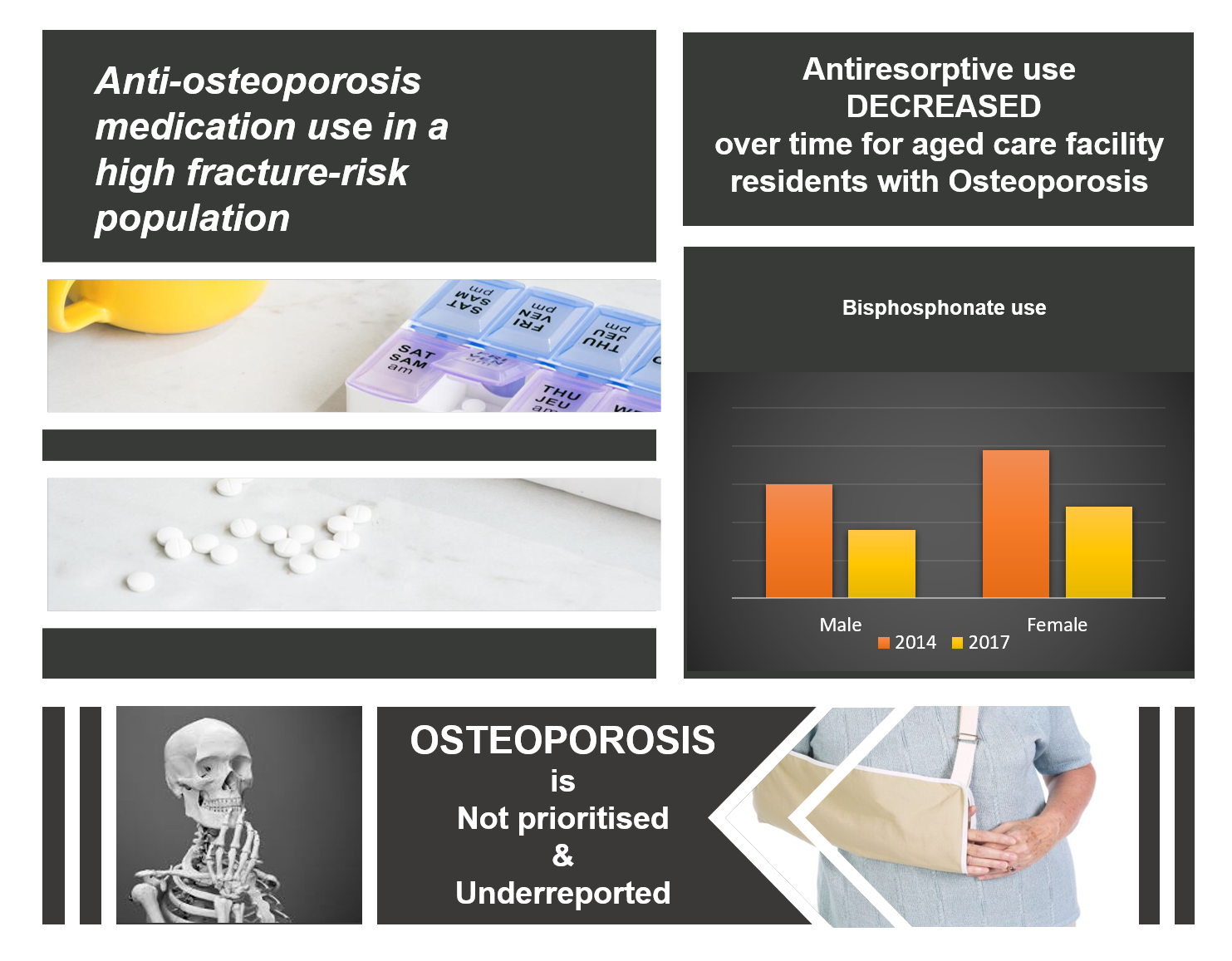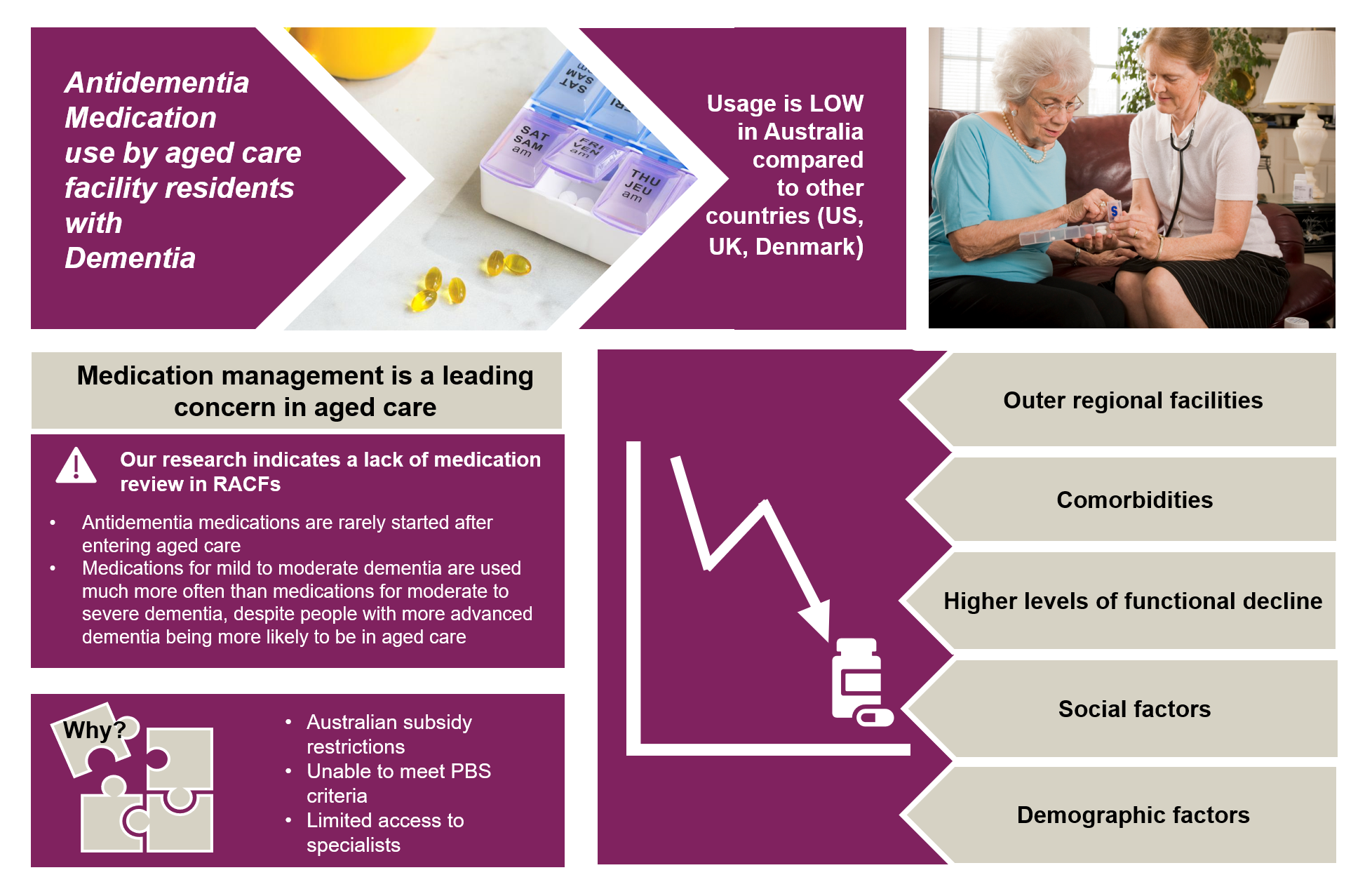The Aged Care Evaluation and Research (ACER) Team

The Aged Care Evaluation and Research (ACER) team is part of the Centre for Health Systems and Safety Research at the Australian Institute of Health Innovation, Macquarie University. ACER comprises a collaborative, multidisciplinary team of researchers conducting world-class research relevant to residential and community aged care settings.
Older people receiving aged care services face widespread quality and safety issues due to the greater vulnerability and the rising healthcare needs of this growing population. The goal of ACER is to generate high-quality evidence through applied and translational research to improve health and service delivery outcomes in both residential and community aged care settings. Our researchers apply novel quantitative and qualitative research methodologies and sophisticated analytical approaches with a strong connection to consumer involvement to achieve this goal.
There are four interconnected research themes within ACER
Consumer-driven health services and informatics
Communities, consumers and health care providers are seeking effective ways to plan and manage the health and support services required to enable older adults to actively engage in society and maintain a high quality of life. Health information and communication technologies (ICT) can help meet these challenges. Examples of areas of interest of the team include:
- Unlocking valuable data and integrating health and aged care information to answer important questions about care trajectories, outcomes, and strategies to improve practice with end-users, consumers and key stakeholders (e.g., national aged care medication roundtable)
- Evaluating the patient and health system impacts of health informatics interventions including clinical dashboards, digital health records and apps
- Harnessing routinely collected electronic data to generate practice and policy-relevant evidence (e.g., developing learning health systems)
- Optimising decision support tools to improve care, outcomes, and user experience
- Monitoring and evaluating the impact of major health policy initiatives in aged care.
Geriatric pharmacoepidemiology & pharmacy informatics
Pharmacoepidemiology involves the application of epidemiological methods to study the use and effects of medications in real-world care settings. Pharmacy informatics is a subset of health informatics focusing on the intersection between information technology and medication use. The increasing availability of large, population-level, routinely collected electronic health data allow us to conduct cutting-edge pharmacoepidemiologic and pharmacy informatics studies in aged care. Examples of areas of interest include:
- High-risk medication uses (e.g., psychotropics) and their effects on health outcomes
- Medicine utilisation studies including trend analyses (e.g., antibiotic use, concordance of treatments against guidelines)
- Monitoring and reporting of meaningful quality use of medicines indicators using informatics
- Designing and testing novel informatics interventions to improve medication management.
Predictive and prescriptive analytics
Predictive analytics focuses on forecasting potential future events while prescriptive analytics provides recommendations based on predictions. Our researchers apply novel statistical and machine learning approaches to achieve this, using large electronic aged care providers and hospital admission data. An example of a project applying prescriptive analytics (i.e., predictive analytics dashboard with embedded decision support) can be found here. Examples of areas of interest include:
- Development and validation of risk prediction and monitoring tools relevant to aged care settings
- Designing and evaluating predictive analytical dashboard to support personalised aged care
- Applications of advanced predictive modelling techniques (including machine learning) to support the safety and efficiency of aged care
- Developing and testing novel web-based applications to examine variation in medication use
Chronic disease care and healthy ageing
Four in five Australians aged 65 and over have at least one chronic health condition causing significant health and economic burden. Our ACER team conduct both quantitative and qualitative studies to understand, monitor and optimise chronic disease care and healthy ageing in aged care. Examples of areas of interest include:
- Monitoring and evaluating chronic disease epidemiology, appropriateness of pharmacotherapy, health outcomes and service utilisation (e.g., Parkinson’s disease, dementia, diabetes)
- Engaging aged care clients, workforce and consumers in research to provide valuable insight into the needs and preferences of older people
- Using information technology to monitor and optimise social participation and quality of life of people receiving aged care services
- Development and evaluation of indicators of healthy life expectancy (e.g., depression-free life expectancy)
ACER team


|
|
|
|
|
|
|  Dr Tim Badgery-Parker Research Fellow |
|
|
|  Dr Andrea Timothy Research Fellow |
|
|
|
|
|
|
|
| Narjis Batool |
Stream CoordinatorDr Nasir Wabe | ||
Follow us on | ||
|---|---|---|
ACER projects
- A dashboard of predictive analytics and decision support: Improving the quality of aged care in Australia
- A National Aged Care Medication Roundtable - Translating aged care data into action to improve quality of care through collaboration and co-design
- Ageing Well: social participation and wellbeing tools to enhance the delivery of quality, person-centred community aged care services
- Brain Bootcamp: Test, Train, Sustain
- Connections Matter: the role of social networks in community aged care
- Driving digital connectivity in residential aged care and the private system with My Health Record
- Evaluating the impact of aged care policy reforms
- iConnect: Improving the way social interactions are recorded in aged care facilities
- Improving the quality of aged care in Australia
- Leveraging information technology to monitor the health and outcomes of residential and community aged care clients
- Novel informatics approach for automated reporting of aged care quality measures: Towards a unified intelligent system
Centres related to this research
Centre for Health Systems and Safety Research
See other ACER projects and initiatives |
ACER news
 | New NHMRC Partnership Project in Aged CareMacquarie University has been awarded $1.4 million in National Health and Medical Research Council funding for ‘A National Aged Care Medication Roundtable - Translating aged care data into action to improve quality of care through collaboration and co-design’. Professor Johanna Westbrook will lead the Roundtable, designed to directly support national aged care policy and targets, Commonwealth national aged care quality indicators, along with recommendations from the Royal Commission. This highly collaborative project will devise innovative and practical IT based solutions to address poor medication management which was the topic of more than one third of issues reported to the Royal Commission into Aged Care Quality and Safety and is the greatest source of complaint to the Aged Care Quality & Safety Commission. |
 | Aged care health status algorithmsResearchers within the Aged Care Evaluation and Research (ACER) team here at Macquarie University have developed aged care health status algorithms. The algorithms are free to access and download by national and international researchers looking to identify health conditions amongst older adults in residential aged care (nursing home) settings. |
 | We are looking for PhD CandidatesPassionate about aged care, digital health or health systems? Eager to improve service delivery and quality of life of older adults? The Aged Care Evaluation and Research (ACER) team at the Australian Institute of Health Innovation (AIHI), Macquarie University has an opportunity for a PhD candidate to undertake research on an NHMRC funded partnership grant. The research involves developing and evaluating an electronic dashboard to improve the delivery of care to clients in residential and community aged care. The partners on this project, Sydney North Health Network (SNHN), Northern Sydney Local Health District, Anglicare, Aged Care Quality and Safety Commission and Australian Healthcare and Hospitals Association, will allow for strong potential for translation of the research and development of skills and connections within these industries. The successful candidate will have the opportunity to be co-located at the SNHN. Interested? View the full scholarship details. |
More ACER News |
ACER initiatives
Osteoporosis: Underreporting and undertreatment in residential aged care facilities puts people at risk

Osteoporosis causes a significant reduction in bone density and currently affects over 1 million Australians. Although preventable, if the condition is not treated with medication, exercise and dietary changes older people can be at increased risk of fractures which can lead to chronic pain, increased dependency, functional decline, and premature death. Untreated osteoporosis will lead to an estimated 866 out of 100,000 women suffering from a hip or femur fracture within the span of a year. For older individuals with osteoporosis, even minor bumps could result in fracture cascades.
The first large study of osteoporosis medication use among people in Australian residential aged care facilities showed that osteoporosis is likely underreported in electronic health records. Based on international studies, 85% of people in residential aged care are expected to have osteoporosis. However, according to research by Dr Kim Lind and the ACER team at the Australian Institute of Health Innovation published in the journal of Health Services Insights the recognition of osteoporosis is much lower – only 34%.
Results from the study suggest that many people may not be receiving the PBS subsidised medication that would reduce their risk of fracture. Researchers speculate that since multiple chronic health conditions are common for people living in residential aged care facilities, osteoporosis remains unrecognised and not prioritised, leading to undertreatment and underreporting.
The Royal Commission in Aged Care Quality and Safety has highlighted that medication management is a leading concern. Osteoporosis identification and management is a prime example of where systematic monitoring of adherence to medication guidelines could quickly improve the care of our most vulnerable people. As a result of these findings from over 10,000 residents in 68 residential aged care facilities in NSW and ACT, Macquarie University researchers are urging for better recognition and treatment of osteoporosis for people living in aged care facilities.
Antidementia medication use: Implications for medication management in RACFs

Dementia is the second leading cause of death in Australia. It causes cognitive, behavioural and psychological changes as well as a loss of physical functioning. Currently, there are no disease-modifying treatments for dementia, but there are medications (cholinesterase inhibitors and memantine) that can improve symptoms and quality of life, but little is known about the use of these medications in Australia, and specifically in the residential aged care setting.
Researchers at Macquarie University conducted the first study to examine antidementia medication use in residents with dementia in Australian aged care facilities.
The findings, published in the International Journal of Geriatric Psychiatry, indicate that antidementia medication use is strikingly low compared to other countries and use decreased over the 3 year period. Lower levels of antidementia medication use was found in residents living in rural or regional facilities, suffering from multiple chronic health conditions, with greater functional decline, and for foreign-born residents. Antidementia medications are rarely initiated after being admitted to a facility and majority of the sample were administered mild to moderate dementia medication rather than moderate to severe dementia medication, which is more common for people living in a high care setting.
Medication management is a priority for the Royal Commission in Aged Care Quality and Safety and the research by Dr Kim Lind and the ACER team demonstrates that medication monitoring in RACFs is possible with existing electronic health record data.
Researchers suspect that Australian subsidy restrictions may be a barrier to accessing these medications. Additionally, facilities in remote areas may have particularly limited access to specialist consultations to obtain or confirm a dementia diagnosis – a necessary step in order to qualify for PBS subsidisation. Macquarie University researchers call for an increased focus on antidementia medication assessment and review, and use of electronic health record data for improving the quality of aged care for people with dementia.
ACER in the media
| Predictive falls risk model for aged careDr Karla Seaman attended the Australian Association of Gerontology national conference this week and reported on the research currently being undertaken in the Aged Care Evaluation and Research (ACER) team working with aged care provider Anglicare to develop a predictive falls risk model for the aged care sector. This research was reported on in Australian Ageing Agenda, please see the full article here. |
| Behaviour-related harm in aged care facilitiesA recent study by Bella St Clair, PhD Candidate reveals that behaviour-related harm is almost as likely to contribute to adverse events in aged care facilities as falls. To learn more about the study please see recent media coverage in Australian Ageing Agenda and the journal article Incidence of adverse events in residential aged care in Australian Health Review. |
| Antibiotic use is higher in Australia's residential aged care facilities than in other countriesDr Magda Raban is interviewed by Aged Care Insite on our recent research comparing the use of antibiotics in residential aged care facilities internationally, Temporal and regional trends of antibiotic use in long-term aged care facilities across 39 countries, 1985-2019: Systematic review and meta-analysis. To read the article, please visit Aged Care Insite. |
More ACER Media
- Westbrook (October 2024) Real-time notifications of medications changes to enhance safety ; Pulse+IT
- Westbrook (October 2024) BESTMED launches research-backed software; Australian Ageing Agenda
- Westbrook (October 2024) BESTMED enlists families to improve medication management; Hello Leaders AUS
- Westbrook (October 2024) Smart tool for aged care; Pharmacy Daily
- Westbrook (February 2023) BestMed to launch electronic controlled drug register for aged care facilities - Pulse+IT
- Westbrook (October 2022) Evidence for how IT systems can improve medication management in aged care - Pulse+IT
- Westbrook (October 2022) RACF research - Pharmacy Daily
- Westbrook (October 2022) Macquarie University and BESTMED partner in new research project - Inside Ageing
- Westbrook (September 2022) Grants awarded to help deliver better outcomes for older people - Australian Ageing Agenda
- Westbrook (June 2022) Addressing the digital disconnect - Australian Ageing Agenda
- Wabe N (May 2022) Experts say falls tool is a safety risk - Aged Care Insite
- Wabe (May 2022) Falls risk: over 65% of at-risk people missed by routine assessment – Aged Health
- Wabe (April 2022) More than 65% of People at Risk of a Fall in Aged Care Are Missed by Routine Assessment - Aged Care Online
- Nguyen A (2020). Amid the rush to telehealth, let’s ensure we address these cautions and questions. Croakey Health Media.
- Siette J (2020). Some timely suggestions for social care for older people. Croakey Health Media
- Nine News Sydney (2019) - Aged care residents on drug 'triple whammy' face risk of acute kidney injury
- Skatssoon J (2019) Home care providers outnumber residential providers for first time. Australian Ageing Agenda
- Skatssoon J (2019). Home care reforms leaving most vulnerable behind. Community Care Review.
- Burke C (2019). Gout on the rise, underdiagnosed in aged care. Aged Care Insite. September 2019
- Burke C (2019). The cost of chronic disease in Australia: ABC’s 7.30 report. Aged Care Insite. July 2019
- Cheu S (2019). Researchers developing data tool to identify at-risk residents. Australian Ageing Agenda.
- Cheu S (2019). Gout under-recognised in residential aged care. Australian Ageing Agenda. August 2019
- Power J (2019). Dementia: How big is the ageing tsunami? It’s a best guess scenario. The Sydney Morning Herald
- Power J (2019). Aged care residents on drug ‘triple whammy’ face risk of acute kidney injury. The Sydney Morning Herald
- Power J (2019). Aged care residents turned into ‘zombies’ on antipsychotics for more than 200 days at a time. The Sydney Morning Herald
- Jorgensen M, Lind KE, Georgiou A, Westbrook J. (2018) Big data analytics meets aged care The Health Advocate 51: 44-45
- Jorgensen M. (2019) Aged care reforms stumble as older Australians struggle to stay at home. The Lighthouse January 2019
- Westbrook J. (2018) Aged care: no need to wait for Royal Commission. MJA InSight November 2018
- Siette J. (2019) Is memory decline an inevitable part of ageing? The Lighthouse March 2019
- Braithwaite J, Westbrook J, Coiera E. Evidence-based research is key to the Aged Care Royal Commission. Sydney: Macquarie University 2018
- Skatssoon, J. (2018) Talking about social engagement pays off. Australian Ageing Agenda August 2018
- Brett L, Georgiou A, Jorgensen M, Siette J, Scott G, Westbrook J. (2017) Where have all my friends gone? The Health Advocate 44: 34-35.
- Egan N. (2017) Link between home care hours, social support and entry to residential care. Australian Ageing Agenda September 2017
- Sax Institute. Researchers use data analytics to map aged care journey. Sydney: Sax Institute 2017
- ABC Radio Hobart – interview with Dr Mikaela Jorgensen on aged care.
Recent ACER publications
- Churruca K, Graham J, Ellis LA, Westbrook J, Wabe N, Hibbert PD, Ludlow K, Urwin R, Meulenbroeks I, Thanigasalam J, Svaleng I (2024) Building a culture of safety in Australian residential aged care facilities: protocol for a longitudinal mixed methods research programme. BMJ open.
- Wabe N, Meulenbroeks I, Firempong DC, Raban MZ, Nguyen AD, Close JT, Lord SR, Westbrook JI (2024) Vitamin D supplementation and falls in residential aged care: A longitudinal multisite cohort study. Bone Reports.
- Wabe N, Huang G, Silva SM, Nguyen AD, Seaman K, Raban MZ, Gates P, Day R, Close JC, Lord SR, Westbrook JI (2024) A longitudinal study of the use and effects of fall-risk-increasing drugs in residential aged care. Journal of the American Medical Directors Association.
- Huang G, Wabe N, Raban MZ, Silva SS, Seaman K, Nguyen AD, Meulenbroeks I, Westbrook JI (2024) The relationship between participation in leisure activities and incidence of falls in residential aged care. PLoS one.
- Wabe N, Meulenbroeks I, Huang G, Silva SM, Gray LC, Close JC, Lord S, Westbrook JI (2024) Development and internal validation of a dynamic fall risk prediction and monitoring tool in aged care using routinely collected electronic health data: a landmarking approach. Journal of the American Medical Informatics Association.
- Meulenbroeks I, Mercado C, Gates P, Nguyen A, Seaman K, Wabe N, Silva SM, Zheng WY, Debono D, Westbrook J (2024) Effectiveness of fall prevention interventions in residential aged care and community settings: an umbrella review. BMC geriatrics.
- Meulenbroeks I, Wabe N, Raban MZ, Seaman K, Westbrook J (2024) Falls in focus: an analysis of the rate of falls in 25 Australian residential aged care facilities from 2019 to 2021, pre-and during COVID-19 lockdowns. BMC Health Services Research.
- Nguyen AD, White SJ, Tse T, Cartmill JA, Roger P, Hatem S, Willcock SM (2024) Communication during telemedicine consultations in general practice: perspectives from general practitioners and their patients. BMC Primary Care.
- Wabe N, Timothy A, Urwin R, Xu Y, Nguyen A, Westbrook JI (2024) Analysis of Longitudinal Patterns and Predictors of Medicine Use in Residential Aged Care Using Group‐Based Trajectory Modeling: The “MEDTRAC‐Cardiovascular” Longitudinal Cohort Study. Pharmacoepidemiology and Drug Safety.
- Wabe N, Urwin R,Seaman K, Timothy A, Raban MZ, Westbrook J (2024) Analysis of longitudinal patterns and predictors of medicine use in residential aged care using group-based trajectory modelling: The MEDTRAC-Polypharmacy longitudinal cohort study. British Journal of Clinical Pharmacoepidemiology; [E-pub ahead of print].
- Xu Y, Aung HL, Hesam-Shariati N, Keay L, Sun X, Phu J, Honson V, Tully P, Booth A, Lewis E, Anderson CS (2024) Contrast Sensitivity, Visual Field, Color Vision, Motion Perception, and Cognitive Impairment: A Systematic Review. Journal of the American Medical Directors Association.
- Bhalla H, Huang G, Seaman K, Silva SS, Wu B, Wabe N, Westbrook JI, Nguyen AD (2024) Diabetes in residential aged care: Pharmacological management and concordance with clinical guidelines. Australasian Journal on Ageing.
- Wabe N, Urwin R, Seaman K, Westbrook JI (2024) Longitudinal cohort study of discrepancies between prescribed and administered polypharmacy rates: implications for National Aged Care Quality Indicator Programs. BMJ Quality & Safety.
- Meulenbroeks I (2024) Restorative and Wellbeing care in Australian Residential Aged Care Facilities – Policy brief published by the Deeble Institute.
- St.Clair B, Nguyen AD, Jorgensen M, Georgiou A (2024) Adverse impacts in residential aged care facilities: The resident perspective. Australasian Journal on Ageing.
- Siette J, Nguyen AD, Brett L, Dodds L, Georgiou A (2024) Co-production processes for translation and validation of psychosocial assessments for older adults in aged care. Australasian Journal on Ageing.
- Seaman K, Huang G, Wabe N, Nguyen A, Pinto S, Westbrook J (2023) Hospitalisations before and after entry into a residential aged care facility: An interrupted time series analysis. Australasian Journal on Ageing.
- Seaman K, Meulenbroeks I, Nguyen A, Silva S, Wabe N, Huang G, Hibert P, Paudel P, Westbrook J (2023) Innovative approaches to analysing aged care falls incident data: international classification for patient safety and correspondence analysis. International Journal for Quality in Health Care.
- Siette J, Dodds L, Sharifi F, Nguyen A, Baysari M, Seaman K, Raban M, Wabe N, Westbrook J (2023) Usability and acceptability of clinical dashboards in aged care: systematic review. JMIR aging.
- Huang G, Wabe N, Raban MZ, Seaman KL, Silva SM, Westbrook JI (2023) The relationship between fall incidents and place of birth in residential aged care facilities: a retrospective longitudinal cohort study. BMC geriatrics.
- Wabe N, Siette J, Seaman KL, Nguyen AD, Raban MZ, Close JC, Lord SR, Westbrook JI (2022) The use and predictive performance of the Peninsula Health Falls Risk Assessment Tool (PH-FRAT) in 25 residential aged care facilities: a retrospective cohort study using routinely collected data. BMC geriatrics.
- Wabe N, Seaman KL, Nguyen AD, Siette J, Raban MZ, Hibbert P, Close JC, Lord SR, Westbrook JI (2022) Epidemiology of falls in 25 Australian residential aged care facilities: a retrospective longitudinal cohort study using routinely collected data. International Journal for Quality in Health Care.
- Seaman K, Ludlow K, Wabe N, Dodds L, Siette J, Nguyen A, Jorgensen M, Lord SR, Close JC, O’Toole L, Lin C (2022) The use of predictive fall models for older adults receiving aged care, using routinely collected electronic health record data: a systematic review. BMC geriatrics.
- Ludlow K, Westbrook J, Jorgensen M, Lind KE, Baysari MT, Gray LC, et al. Co-designing a dashboard of predictive analytics and decision support to drive care quality and client outcomes in aged care: a mixed-method study protocol. BMJ Open. 2021;11(8):e048657
- Lind K.E, Raban M.Z, Brett L, Jorgenson M.L, Georgiou G, Westbrook J.I (2020). Measuring the prevalence of 60 health conditions in older Australians in residential aged care with electronic health records: a retrospective dynamic cohort study. Population Health Metrics
- Lind K.E, Raban M.Z, Brett L, Jorgenson M.L, Georgiou G, Westbrook J.I (2020). Measuring the prevalence of 60 health conditions in older Australians in residential aged care with electronic health records: a retrospective dynamic cohort study. Population Health Metrics
- Raban M.Z, Lind K.E, Day, R.O, Gray L, Georgiou A, Westbrook J.I (2020) Trends, determinants and differences in antibiotic use in 68 residential aged care homes in Australia, 2014-2017: a longitudinal analysis of electronic health record data. BMC Health Services Research
- Siette J, Berry H, Jorgenson M, Brett L, Georgiou A, McClean T, Westbrook J (2020), Social participation Among Older Adults Receiving Community Care Services. Journal of Applied Gerontology
- Siette, J, Georgiou, A, Brayne, C, Westbrook, J. I (2020). Social networks and cognitive function in older adults receiving home- and community-based aged care. Archives of Gerontology and Geriatrics.
- Jorgensen M, Siette J, Georgiou A, Westbrook JI (2020).The effect of home care package allocation reforms on service uptake, use and cessation at a large Australian aged care provider. Australasian Journal on Ageing.
- Brett L, Siette J, Nguyen AD, Jorgensen M, Miao M, Westbrook JI, Lee W, Gow E, Hourihan F, Georgiou A (2019). At the grassroots of home and community-based aged care: strategies for successful consumer engagement. BMJ Open
- Brett L, Noblet T, Jorgensen M, Georgiou A (2019). The use of physiotherapy in nursing homes internationally: a systematic review. PLOS One; 14(7):e0219488.
- Lind (2020). Highlighting the Need for Action Regarding Persistent Sex Bias in Research. JAMA Internal Medicine.
- Nguyen A, Lind KE, Day R, Georgiou A, Westbrook J. A profile of health status and demographics of aged care facility residents with gout. Australasian Journal on Ageing.
- Brett L, Mguyen A, Siette J, Dove-Pizarro J, Hourihan F, Georgiou A (2019) The co-design of timely and meaningful information needed to enhance social participation in community aged care services: Think Tank proceedings. Australiasian Journal on Ageing.
- Siette J, Georgiou A, Westbrook J (2019). Observational cohort study investigating cognitive outcomes, social networks and well-being in older adults: a study protocol. BMJ Open.
- Lind KE, Raban MZ, Georgiou A, Westbrook J (2019). NSAID use among residents in 68 residential aged care facilities 2014 to 2017: An analysis of duration, concomitant medication use, and high-risk conditions. Pharmacoepidemiology & Drug Safety.
- Lind KE, Raban MZ, Georgiou A, Westbrook JI (2019). Duration of Antipsychotic Medication Use by Aged Care Facility Residents With Dementia. Alzheimer Disease & Associated Disorders.
- Lind KE, Jorgensen M (2019). Cleaning the air: why a link between Alzheimer’s disease and air quality cannot be validly determined using prescription data in Australia. Health & Place.
- Lind KE. (2019) Aged care residents miss out on anti-dementia meds. The Lighthouse June 2019
- Lind KE, Jorgensen ML, Gray LC, Georgiou A, Westbrook JI. (2019) Anti-osteoporosis Medication Use in a High Fracture-Risk Population: Contemporary Trends in Australian Residential Aged Care Facilities. Health Services Insights.
- Lind KE, Gray LC, Raban MZ, Georgiou A, Westbrook J (2019). Anti‐dementia medication use by aged care residents with dementia. International Journal of Geriatric Psychiatry.
- Brett L, Georgiou A, Jorgensen M, Siette J, Scott G, Gow E, Westbrook J (2019). Ageing well: evaluation of social participation and quality of life tools to enhance community aged care (study protocol). BMC Geriatrics, 19(1), 78.
- Siette J, Georgiou A, Jorgensen M, O'Donnell C, Westbrook J (2018). Integrating social engagement instruments into community aged care assessments to enhance service provision. Journal of Health & Social Care in the Community; 26(6):810-818.
- Jorgensen M, Siette J, Georgiou A, Westbrook J (2018). Longitudinal variation in pressure injury incidence among long-term aged care facilities. International Journal for Quality in Health Care; [Epub ahead of print].
- Pont L, Raban MZ, Jorgensen M, Georgiou A, Westbrook J (2018). Leveraging new information technology to monitor medicine use in 71 residential aged care facilities: variation in polypharmacy and antipsychotic use. International Journal for Quality in Health Care; [Epub ahead of print].
- Jorgensen M, Siette J, Georgiou A, Warland A, Westbrook J (2017). Modelling the association between home care service use and entry into residential aged care: a cohort study using routinely collected data. Journal of the American Medical Directors Association; 19(2):117-21.
- Douglas H, Georgiou A, Tariq A, Prgomet M, Warland A, Armour P, Westbrook J (2017). Implementing information and communication technology to support community aged care service integration: Lessons from an Australian aged care provider. International Journal of Integrated Care; 17(1):9-21.
- Prgomet M, Douglas H, Tariq A, Georgiou A, Armour P, Westbrook J (2017). The work of front line community aged care staff and the impact of a changing policy landscape and consumer-directed care. The British Journal of Social Work; 47(1):106–124.
- Borotkanics R, Rowe C, Georgiou A, Douglas H, Makeham M, Westbrook J (2017). Changes in the profile of Australians in 77 residential aged care facilities across New South Wales and the Australian Capital Territory. Australian Health Review; 41(6):613-620.
- Douglas H, Georgiou A, Westbrook J (2016). Social participation as an indicator of successful aging: an overview of concepts and their associations with health. Australian Health Review; 41(4):455-462.
- Tariq A, Georgiou A, Raban M, Baysari M, Westbrook J (2016). Underlying risk factors for prescribing errors in long term aged care: a qualitative study. BMJ Quality and Safety; 25(9):704-715.
- Tariq A, Douglas H, Smith C, Georgiou A, Osmond T, Armour P, Westbrook J (2015). A descriptive analysis of incidents reported by community aged care workers. Western Journal of Nursing Research;37(7):859-76.




















